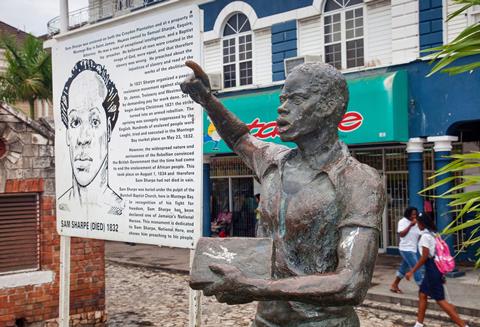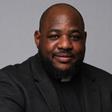Sam Sharpe was a Jamaican Baptist deacon who was hung for inciting a riot in 1831. He played a key role in ending the enslavement of Africans in the Caribbean. This Black History Month, Rev Dr Carlton Turner pays tribute to the faith of a man who sought to bring freedom to his people

As we celebrate Black History Month in the UK and try to make sense of how Black people across the globe have managed to sustain their faith under the pervasiveness of racism, Sam Sharpe is a key figure.
Sharpe was an educated slave in Jamaica who converted to Christianity and became a Baptist deacon, ministering among many different groups of enslaved persons. Sharpe realised that his reading of the Bible conflicted with the brutality of enslavement that he and his people lived under and, when he became aware of rumours that Great Britain was debating the abolition of slavery, it was an opportune time to agitate for a kind of life in which all persons were free, regardless of ancestry or skin colour.
Made a martyr
In 1831, Sharpe used his networks to inspire a regional strike in which enslaved persons were to not go back to work after Christmas Day. What started out as a peaceful resistance turned into a massive rebellion in Jamaica.
More than 20,000 rebels seized control of the north-west corner of the island, setting planters’ houses on fire. It took the British Army and militia a month to restore order. Some 200 enslaved African people and 14 white people died in the fighting and at least 340 enslaved people were hanged or shot afterwards.
Sam Sharpe was tried on 19 April 1832, as leader of the insurrection, and executed shortly after. Historical accounts, particularly from the trial testimonies, paint Sharpe as a leader who wanted peaceful resistance but who was prepared for armed conflict if neccessary. His most famous words give us an understanding of his faith commitments: “I would rather die upon yonder gallows than live my life in slavery.”
We must consider the ways in which others are ignored, denied or harmed because of our faith practices
In Jamaica, Sam Sharpe is celebrated as a national hero and a key figure in the history of the Church in the Caribbean. But when we take a closer look, we see that it wasn’t only his Baptist faith that fuelled his liberative efforts, but also his traditional African and religious heritage.
Sharpe wasn’t simply a Baptist deacon; he was a Native Baptist. The faith of this group of Baptist slaves more resembled African traditional norms than eurocentric ones. Jamaican scholar, Professor Dianne Stewart, explains that Sharpe resisted plantation slavery not only because of his Baptist roots, but also because of his myalism.
Spiritual wholeness
Myal spirituality refers to African traditional practices and rituals found in the English-speaking Caribbean that functioned mainly to bring about a kind of wholeness amid the destructiveness of the slave plantation.
Such practices include reverence for herbs and the healing power of nature; reverence for ancestors; the deep belief in, and access to, the spiritual world; and the belief in divine power to resist oppression, but also to heal.
These are key components of African Caribbean spiritualities and, for Sharpe, his culture and ancestry informed his Christian faith in a way that exposed the oppressive nature of plantation Christianity in the British colonial world.
Sharpe’s interpretation of the Bible, insisting on passages such as Galatians 3:28: “There is neither Jew nor Greek, there is neither bond nor free, there is neither male nor female; for ye are all one in Christ”, and Matthew 6:24: “No man can serve two masters: for either he will hate the one, and love the other; or else he will hold to the one, and despise the other. Ye cannot serve God and mammon”, led him to two conclusions. Firstly, that slavery was abhorrent and unbiblical, and secondly, that the kind of Christianity that permitted slavery was also unbiblical and ungodly.
While Sharpe sought to engineer a passive resistance, his aim was to contest a system that was destructive in every way to the lives of the enslaved and their descendants.
When the Church harms
Ultimately, Christianity in the African Caribbean, and particularly historical figures such as Sam Sharpe, remind us to pay attention to all the ways that our practices of Christianity are harmful and destructive.
Colonial and racist systems and structures are often normalised, and deeply embedded within both Church and society. The way we read scripture and practice Christianity should ultimately aim to locate and address these often-hidden realities.
We can do this in several ways.
Firstly, we must pay attention to how we practice our faith. We can often be engaged in ritual and remain locked into our rhythms of life and worship. However, we must consider the ways in which others are ignored, denied or even harmed because of our faith practices.
Sharpe realised that his reading of the Bible conflicted with the brutality of enslavement
For Sharpe, the Christian Church in the colony of Jamaica preached the love of God as revealed in Jesus Christ, but supported the emotional, spiritual and physical brutality towards African enslaved persons. What the Church did not see was its own deeply embedded racism, and its deep belief that Black people were not human beings as white people were.
Secondly, we must pay attention to how we read scripture and how we think about God and God’s involvement in the world. Sharpe represented something of a prophetic figure who read the signs. He was not only critical of enslavement, he was also deeply suspicious of his formation in the faith. His radical actions suggest that he had processed his own complicity in a denomination and tradition that needed deep change.
Sam Sharpe’s faith urged him to seek wholeness both in society and within his own Christian tradition. May his life and legacy inspire us to do the same.
Rev Canon Dr Carlton Turner will be delivering this year’s Sam Sharpe lecture on 24 October at the Queen’s Foundation, co-sponsored by Queen’s Centre for Black Theology and the Baptist Union of Great Britain. Find out more here


































No comments yet